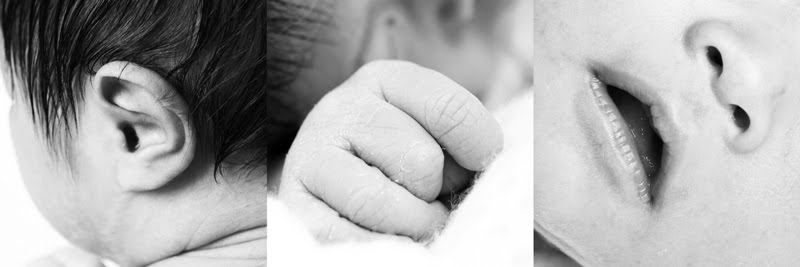Calleigh showed symptoms of teething during her 6th month. Biting is one of them.
 |
| Tried taking a photo of her swelling gums but she won't let me. ^^ |
 |
| Taran!!! not just one but two tiny teeth are peeking! |
Two central bottom teeth! yaiks! ouchy! And maybe this is the reason for her fever, cough and colds. I knew it!
What are the symptoms of teething? - Click here for more info
The
symptoms of teething vary from child to child. Because of these different
experiences, parents and physicians often disagree as to the symptoms of
teething and how painful it is. The list below shows symptoms that a teething
baby may experience. While most parents usually agree that some or all of the
symptoms below happened around the time of teething, it is still recommended
that if your baby experiences any of these symptoms you check with your
pediatrician to rule out other possible causes for the symptoms.
Irritability:
As the sharp little tooth rises closer to the surface your baby’s gums
may become increasingly more sore and painful, leading to your baby being very
fussy. The pain and discomfort is
most often worse during the first teeth coming in and later when the molars come
in because of their bigger size. This
is most often the case since babies become accustomed to the sensations of
teething and learn to live with them. But
you may find your baby may be fussy during the whole time that every tooth comes
in. Every child reacts differently.
Drooling:
From three to four months of age you may see your baby start drooling
more often than normal. Teething
stimulates drooling, which is often worse with some babies than others.
Coughing:
The extra saliva can cause your baby to occasionally cough or gag.
This is usually nothing to worry about as long as your baby seems fine
and shows no signs of a cold or flu and does not run a high fever.
Chin rash:
If your baby is a big drooler, the constant contact with saliva can cause
the skin around the chin and mouth to become irritated.
To help prevent this, gently wipe your baby’s mouth and chin
periodically throughout the day.
Biting &
gnawing: A baby that is
teething will gnaw and gum down on anything she or he can get their mouth
around. The counter pressure from
biting on something helps relieve the pressure from under the gums.
Cheek rubbing
and ear pulling: Pain in the
gums may travel to the ears and cheeks particularly when the back molars begin
coming in. This is why you may see
your baby rubbing their cheeks or pulling at their ears.
However, keep in mind that pulling at an ear can also be a sign of an ear
infection.
Diarrhea:
While this is a symptom that is disagreed upon by physicians, researchers
and parents, most parents usually notice slightly looser bowel movements when a
baby is teething. While the recent
study done by the Children’s Hospital in Australia found this to be the most
common symptom of teething, there are still many people that will agree and
disagree with this recent study. It is believed that the most likely cause of
this is the extra saliva swallowed, which then loosens the stool.
Be sure and report any diarrhea to your doctor that lasts more than two
bowel movements.
Low-grade
fever: A fever is
another symptom that doctors are sometimes hesitant to directly link with
teething. But there are many
parents who will disagree with this and find their baby gets a slight fever
while teething. The best thing to
do is be extra safe and notify your doctor if a fever last more than two days.
Not sleeping
well: With teething pain
happening during the day and night, you may find your child wakes more often at
night when the pain gets bad enough. Most parents agree that the night waking happens more often
during the first set of teeth and with the molars.
Cold like
symptoms (runny nose, etc.): Some
parents find that their baby will show signs of having a cold.
Runny noses, coughing and general cold symptoms are believed to come from
the baby having their hands in their mouth more often.
Play it safe and always notify your doctor if symptoms such as this
occur.
So, it can be caused by teething. ^^
A rule of thumb: "
"If your baby has symptoms that worry you, don't just chalk it up to teething."


No comments:
Post a Comment